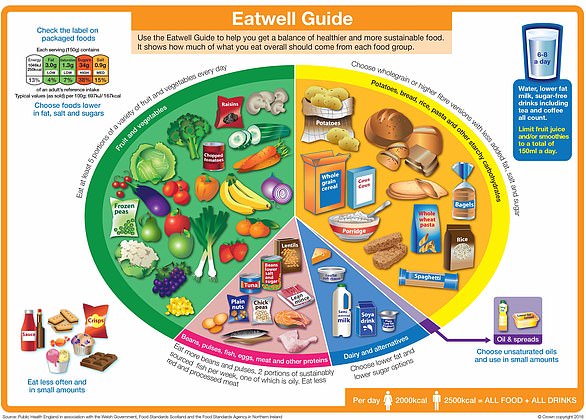Eating a diet rich in vegetables, fruit, nuts and oily fish could reduce the risk of severe Covid infection, a new analysis suggests.
The Mediterranean diet has long been hailed as the secret to Italians and Spaniards living long, healthy lives and having low rates of obesity and diet-related diseases.
It has been shown to reduce inflammation, improve insulin regulation in the body, and control weight, which in turn may help protect against heart disease, dementia, and diabetes.
But now scientists say that a diet that consists of an abundance of fresh fruits, vegetables, fish and olive oil, can also protect us from becoming seriously ill with Covid.
Researchers at an Indonesian university analyzed the results of six previous studies that looked at the impact of the Mediterranean diet on Covid outcomes in a total of more than 55,000 people.
The Mediterranean diet has long been hailed as the secret to Italians and Spaniards living long, healthy lives and having low rates of obesity and diet-related diseases.

Four of the studies found that people who ate a Mediterranean diet were less likely to develop Covid and could reduce symptoms.
High temperature, fever, cough, sore throat and runny nose are telltale signs of Covid.
Four of the studies found that people who ate a Mediterranean diet were less likely to develop severe Covid symptoms.
Although some studies found no conclusive evidence that those who followed the diet had differences in disease severity, researchers say the diet may offer some protection.
All studies measured adherence to the Mediterranean diet using questionnaires, with a scoring system that varied from study to study.
The questionnaires included categories such as: vegetables, fruits and nuts, cereals, legumes, fish, red meat, dairy products and alcohol consumption.

Questionnaires in the studies included categories such as vegetables, fruits and nuts, cereals, legumes, fish, red meat, dairy products and alcohol consumption.
The ratio of monounsaturated to saturated fats was also an essential component in the Mediterranean diet score.
Several studies have recognized how the body protects itself against viral respiratory infection.
A previous study found that healthy plant-based foods were associated with lower odds and severity of Covid.
Another relevant finding was that eating a Mediterranean diet helped patients with recurrent colds and frequent inflammatory complications and significantly reduced episodes and symptoms.
A previous systematic review found that the Mediterranean diet was reported to reduce levels of inflammatory biomarkers in overweight and obese adults.
Similarly, a meta-analysis reported that adherence to the Mediterranean diet effectively reduces SARS-CoV-2 infection by 78 percent.
However, the study authors did not disclose whether participants had received any vaccine against the virus.
However, the diet is believed to improve overall health, mainly by helping to control weight, which also helps prevent heart disease and diabetes, among other conditions.
An independent study published earlier this year found that the diet cuts the risk of death from all causes by nearly a quarter in women.
The study of more than 25,000 healthy middle-aged American women, average age 55, found that eating a diet rich in fish, legumes, vegetables, nuts and whole grains was linked to a 23 percent lower risk of dying at the end of the 25-year study.
Each woman was asked annually about her adherence to the diet, and those who followed it strictly over that 25-year period enjoyed a 16 percent lower risk of death from all causes.
Another study published this month compared following this regimen to a traditional Western diet, rich in low-quality processed foods and sugary treats.
Of the 1,591 adults surveyed, the analysis showed that those who consumed components of the Mediterranean diet generally reported lower levels of perceived stress and mental distress.



